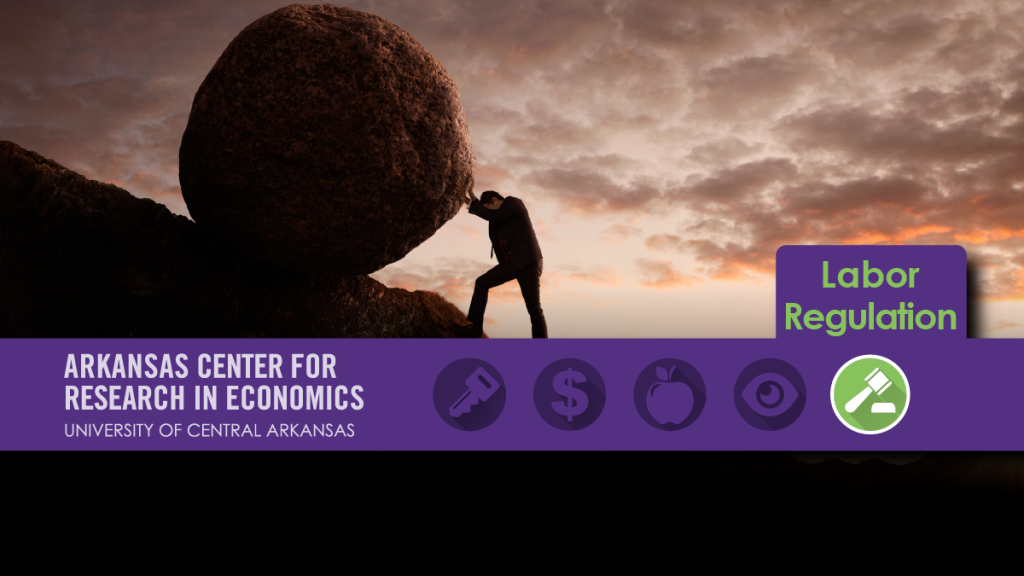
In Arkansas, released prisoners are more likely to re-offend than released prisoners in other places. One reason is Arkansas’s occupational licensing requirements. They are tougher than many other states, in general, and have the potential to be used to discriminate against ex-prisoners, in particular.
In our newest policy brief, Stephen Slivinski, senior research fellow at the Center for the Study of Economic Liberty at Arizona State University, and Thomas Snyder, associate professor of economics at the University of Central Arkansas and an ACRE scholar, take a close look at the relationship between Arkansas occupational licensing laws and crime recidivism.
Arkansas is 1 of 3 states with the heaviest licensing burdens for low to moderate income occupations; occupations mostly likely to be labor market entry points for ex-offenders. States with heavy occupational licensing burdens have increased recidivism over time. Meanwhile, states with light burdens have decreased their rates of recidivism. The authors predict that if Arkansas had lowered its licensing burden to that of Kansas or Missouri, Arkansas’s crime recidivism rate would have fallen by 17.5% in 5 years.
Arkansas’s 1973 “general rehabilitation” law was meant to ensure that the state did not discourage employment for ex-offenders. But that law has been hampered by political pressures and judicial decisions. Returning to the original intent of the “general rehabilitation” statue would help ex-offenders break free from cycles of crime. It would also protect Arkansans from future crimes and higher taxes.
You can download it by clicking here. If you have thoughts or questions about this study, you can email ACRE at acre@uca.edu. If you would like a printed copy for your own home or office, please email acre@uca.edu with the subject line Printed Second Chances, and include your name, your organization’s name, and your address.
To learn more about occupational licensing in Arkansas see Snyder’s other work:
“Unnatural Rights in the Natural State”
by Dr. David Mitchell, Dr. Thomas Snyder, and Ms. Amy Fontinelle
In this policy review, the authors examine which occupations have the most burdensome licensing laws, how these restrictions affect job seekers, entrepreneurs, and consumers; and how we can reform the worst parts of these regulations.
“Occupational Licensing and Property Crime”
by Dr. Thomas Snyder and UCA graduate student Saliou N. Ouattara
In this paper published in the Journal of Regional Analysis and Policy, the authors demonstrate that there is a relationship between burdensome licensing requirements and high property crime rates. Snyder and Ouattara find that occupational licensing requirements can lead to an increase in property-crime rates.
“The Effects of Arkansas’ Occupational Licensure Regulations”
by Dr. Thomas Snyder
Arkansas’ extensive occupational licensure requirements hurt the state’s economy, particularly harming the state’s poor. Governments require some occupations to be licensed, making it illegal to work in one of these trades without a license. Arkansas not only requires many occupations to be licensed, but it also has the second-highest average burden—in terms of time and money—imposed on the licensed occupations, second only to Hawaii. In other words, not only does Arkansas require licensure of more categories of workers than most states do, the difficulty of acquiring each license in Arkansas is especially burdensome when compared to other states.
“The State of Occupational Licensure in Arkansas”
by Dr. Patrick A. McLaughlin, Dr. Matthew D. Mitchell, Anne Philpot, and Dr. Thomas Snyder
This Mercatus Center Research Paper outlines occupational licensure in Arkansas by giving a snapshot of the entire landscape of occupational licensing in Arkansas. It goes into detail explaining how Arkansas is above the national average in terms of number of licensed occuaptions, licensing fees, and required training and experience. It explains how very few studies show clear positive effects resulting from occupational licensing. Most studies show that occupational licesning increases prices, doesn’t increase quality, and has a disparate impact on ethnic minorities, military spouses, and others. A summary of the findings are on this infographic.
You can also see Stephen Slivinski present his research in a talk entitled, “Weighing Down the Bootstraps” which was a part of ACRE’s Distinguished Speaker Series.
To see more of ACRE’s work relating to this topic, visit our Labor Market Regulation page.
